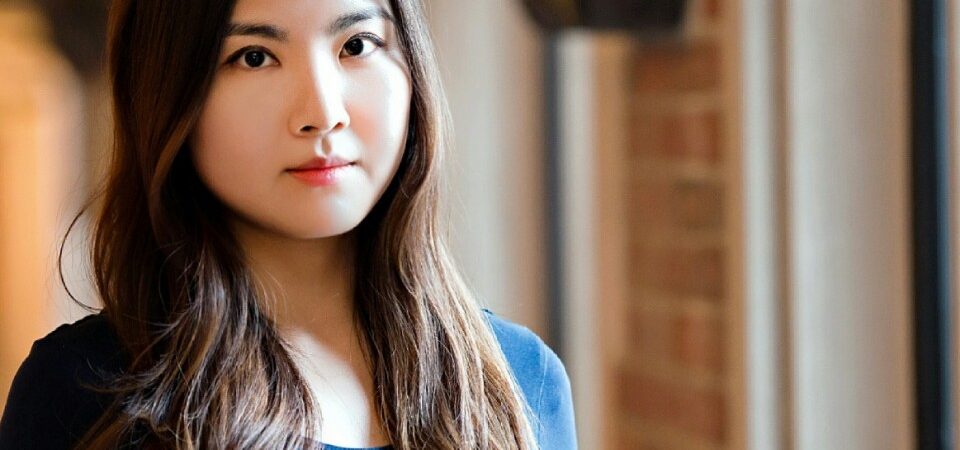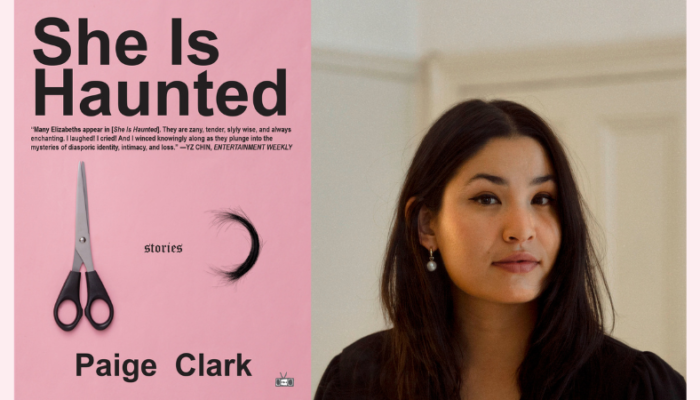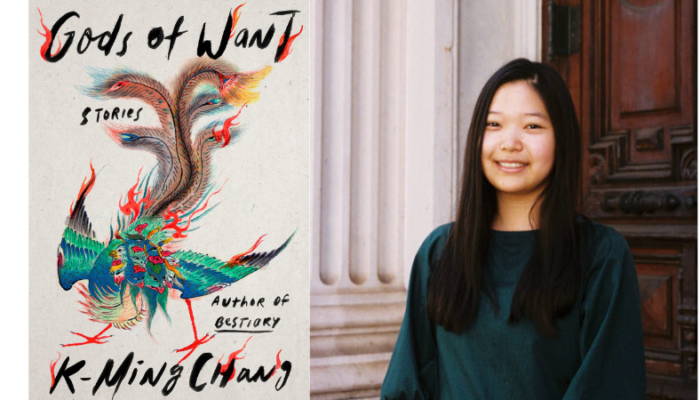Emily Jungmin Yoon delves into the history, politics, and linguistics of America and Korea in her stunning, complex poems. I admire her ability to weave narratives together, to move the reader so skillfully through space, time, and different cultures. Her poems ask to be read again and again, so that you can sift through the layered meanings in her words. I am thrilled that her poem, “On the Day of the Gyeongju Earthquake, September 12, 2016” will be published in Apogee Journal Issue 09. In our interview, we spoke about assuaging nostalgia through poetry, the writing process, and political consciousness in art.
—Crystal Hana Kim
Crystal Hana Kim: I am so excited to have your poem, “On the Day of the Gyeongju Earthquake, September 12, 2016” in our upcoming issue! As a Ph.D. student, you must be busy with end-of-the-semester work right now. Thanks for taking this time to speak with me, Emily.
Emily Jungmin Yoon: Thank you so much for inviting me to talk about my work! I am finishing up my last quarter of coursework! So that’s exciting, though now I have to start preparing for my qualifying exams.
CHK: I’m impressed with how you balance academia with your creative work. Now let’s start with your poem “On the Day of the Gyeongju Earthquake, September 12, 2016,” which takes place in a train station in Busan. It seems that you often write about Korea in your poems. Are there any interesting tensions that arise out of using the English language to write about Korean subject matter?
EJY: I think that the tension I feel writing poems about Korea in English comes from a geographical distance more than the linguistic one. Writing about Korea in the United States, in English, is my way of being in both places at once, or rather an attempt to handle a tension or a type of intensity that arises from living in both places at the same time. I mean that as in: even when I am physically in the US, I also have a life in Korea that continues in Korea, and vice versa. Maybe that sounds whacky—but my immediate family, most of my relatives, and a lot of my closest friends from college all live in Korea, and I try to keep up not only with the people but also the country’s culture and politics. Same goes for the US when I am in Korea. It’s really draining to maintain the same level of awareness for two countries, because just reading political news in one country is stressful enough.
CHK: Especially with the new Trump administration, and the Park Geun-hye impeachment in South Korea.
EJY: Still, when I leave one place and then come back, I don’t want to feel as if I return to a point where my time has stopped while others’ has continued. It’s not simply that the “catching up” I have to do then on news and events is taxing—I think that I have an anxiety, need, or greed to occupy, own, or know two homes fully and simultaneously (thus the same impulse doesn’t come through when I purposely take time to go on a trip and “leave my life behind”). So in one country, I try to assuage my nostalgia for the other country’s present through poetry. Poetry allows that, similar to the way poetry about the future and/or the past (that the poet may never have lived) permits the poet and the reader to engage with various temporal realms during their writing/reading experience, in which they have to be very present.
CHK: I know what you mean, and I experience this to a much lesser degree because I have family in Korea. I want to keep up with their culture and politics, but I also am here in America, with a life away from them. I know you’re from Busan, but you live in Chicago now. Does location affect your writing? Do you write differently when you are in Korea versus in America?
EJY: Speaking about location generally, I can only write where I can be alone, silent, and still. I don’t like to write through visual or auditory distraction, not even soft music. So I usually have to be in my room late at night to get moving on a poem. About writing in Korea—this may seem kind of contradictory to what I said previously, about how writing poetry lets me be in both places while physically being in one. But I always had a hard time writing in Korea. I think it’s because I am in Korea only a few months during the year and I always want to be physically active, going places, meeting people, walking my dogs, and looking at things; that desire beats my desire to immerse myself in writing, which is a solitary and stationary act for me. I do read English-language poetry to “be” in the US, so I still use poetry to time- and place-travel while in my pajamas in bed. I think I wrote “On the Day of the Gyeongju Earthquake, September 12, 2016” almost immediately after I came back to the US, which was not long after the date in the title.
CHK: I love how your poem works—the mysterious ‘you’ on the Busan train, the doomsayer screaming about God, your ruminations on religion and political injustice, and then the Gyeongju earthquake. As a novelist, I’m always curious about others’ writing processes. How long did it take you to write this poem, to get the relationships between these parts exactly right?
EJY: I can say maybe it took an hour, if I don’t include the editing time involved in completing the writing process. My favorite poems to write are ones that come very quickly and then bring me back again and again to reread and edit. I don’t believe that they are necessarily born out of a sudden spark of inspiration, though—I imagine they take textual shape after certain topics and subjects have inhabited my mind and intermingled there for a long time. So I can also say that it may have taken me months or years for the poem to become its current form.
CHK: Did you know the shape and structure of this poem from the beginning? Or do you write towards clarity?
EJY: I didn’t plan the poem’s flow or visual appearance when I started writing it, but after finishing the draft, I decided that I like it as a one-stanza poem—its plainness, its matter-of-fact-ness coupled with the themes of frustration, fear, and disaster. If you mean clarity in terms of narrative, I’d say clarity is important to me; I’m not going to explain every story and meaning, but I want to show that there are connections between images and lines. I think it’s up to the reader to reflect on why certain connections are where they are and what they do.
CHK: I’d like to talk about one of those connections a bit more. Although “On the Day of the Gyeongju Earthquake, September 12, 2016” takes place in Busan, you tie in activist Baek Nam-gi’s death from a police water cannon, which occurred at an antigovernment protest in Seoul, with the police shootings of Terence Crutcher in Oklahoma and Keith Lamont Scott in North Carolina. Why was it important for you to include these names?
EJY: Their deaths happened very close to one another in the same year. Baek was pronounced dead on September 25. Crutcher was fatally shot on September 16, and Scott, on September 20. Of course Baek’s death doesn’t have the racial dimension (class is another issue) and Korea’s history of protest and police brutality is completely different from that of the US, but I was thinking about the absolute horror and uproar of these killings. Also, South Korea was in shock (no pun intended) for weeks after the earthquake on September 12, because although it didn’t cause extreme harm to people or even objects, for a country that is usually not prone to earthquakes, it was quite terrifying (in part because we see how devastating they can be in the neighboring country of Japan) and aftershocks continued to occur. The government’s slow and inadequate response to the quakes also resulted in even more increased distrust of the government. My considerations and emotions after all these events came together to join forces with my thoughts on faith and religion and the scenes at the train station.
I also believed that it would be important to name the dead in the poem. I sometimes wonder if many poets are politically conscious and active because one of the goals of being a poet is to pursue and preserve beauty—precisely why sometimes “poetic” serves as a synonym to “beautiful”—and hence poets cannot forgive the ugliness of our realities. When we write poetry, we are confronting that ugliness and pain and still making beauty. I don’t say this to claim some certainty or causality of the relationship between poetry and politics or to propose that we aestheticize and romanticize the stories of the dead or their deaths; I say this to suggest that as poets, we should honor their lives and remember them in the most beautiful way, to the best of our abilities.
CHK: I think you accomplish this in your poem, this “remembering them in the most beautiful way,” and again, I’m grateful that Apogee will be publishing your work in this issue.
I read your recently published poems in Poetry and the New Yorker, and I noticed that both poems have to do with Korean linguistics and history. Were these poems influenced by your Ph.D. studies in East Asian Languages and Civilizations? Do you ever find your creative work and academic work in conflict with one another or do they work in tandem in your life?
EJY: I do think that those poems or my other poems that talk about the Korean language and history are influenced by my experience and education in the department, to an extent. Many Korean literary and historical texts I read are from or about the colonial era and thus deal with the issues of language, mother tongue, bilingualism, censorship, etc. I think my interest in incorporating the Korean language into, or meditating on it in, my poems stems from my background as an English-as-a-second-language person.
I recently said this at the Poetry Foundation’s spring party reading, and I hadn’t really realized it until I uttered it: there is poetry between languages, there is poetry in translation. Some people may view translation as some sort of violence or robbery, but there is also a certain beauty in transformation. One of the reasons chameleons change color is to camouflage—to protect itself. But obviously, it doesn’t become exactly the same figure as its surroundings. If you look closely, it is still the animal wearing a different color. To me, that’s what translation should do: retain, or protect, the essence and life of the text in its original language while turning it into something that can survive in its new linguistic environment (although, of course, this depends on the intention and purpose of the specific work of translation).
When I looked back to times when I would consciously translate from one language to the other to articulate or make sense of something—so I can protect myself—I could recognize the vibrancy of that weird, in-between, and new language, and its place in poetry, where the fluidity, unpredictability, and malleability of language can be welcomed and celebrated. For this reason, I also like thinking about Korean idioms and proverbs in English, e.g. “teeth ache in the absence of lips,” “how could a snail cross the ocean,” “even the moon, when full, tilts down.” The last one could be translated to “every ebb has its flow” since this English proverb has the same meaning, but I love the imagery of the Korean one.
CHK: There’s a romance to the heavy, full moon that the English ‘equivalent’ doesn’t hit for me. I’m always curious about the origins of idioms, what circumstances led to the coined phrase.
EJY: Thinking about translating helped me pay more attention to the quirks of Korean that I hadn’t noticed before as well; I had never thought twice about the expression “murorŭda” (repeated in “Time, in Whales”), how it literally means “to rise in sap (in springtime trees)” but is a figurative way of saying “to rise” as in “to have improved greatly” or “to be at best.” It’s fun to dwell in the understanding that behind each language is culture and so many stories, and want to explore this notion more in poems.
CHK: I hope to read more of your poems about the stories behind language, Korea, and politics—which brings me to my last question. You have a chapbook coming out with Tupelo Press! Congratulations! Can you tell us a bit about this forthcoming publication?
EJY: Thank you! So it is titled Ordinary Misfortunes, and Maggie Smith selected it for the Sunken Garden Poetry Prize. It will be officially released on July 19, which is when I read from it at the Sunken Garden Poetry Festival with Cornelius Eady (eeek!!). Many of the chapbook’s poems are from my series of poems all titled “An Ordinary Misfortune,” which are scattered throughout the volume and deal with various histories of sexual violence, especially against Korean women. In the book’s center is also my long poem “Testimonies,” which has 7 sections—each section is a testimony by a different former “comfort woman” of the Japanese Empire.
CHK: One of the reasons I love your work is because you provide a voice to those who have been marginalized, like the comfort women. I’m very much looking forward to reading Ordinary Misfortunes this summer. Well, congratulations again on your recent publications and the upcoming chapbook! We’re excited to share “On the Day of the Gyeongju Earthquake, September 12, 2016” with the world in our new issue!
EJY: Thank you so much for gifting me this space!
Read Emily’s poem “On the Day of the Gyeongju Earthquake, September 12, 2016” in Apogee Journal Issue 09, on sale June 8th.
Emily Jungmin Yoon‘s poems and translations appear or are forthcoming in The New Yorker, POETRY, Berkeley Poetry Review, PEN Poetry Series, and elsewhere. For her poetry, she has received awards and fellowships from Ploughshares’ Emerging Writer’s Contest, AWP’s WC&C Scholarship Competition, The Home School in Miami, the Aspen Institute, New York University, and the University of Chicago. She is the Poetry Editor for The Margins, the literary magazine of the Asian American Writers’ Workshop, and is a PhD student in the East Asian Languages and Civilizations Department at the University of Chicago. http://emily-yoon-poetry.tumblr.com/




